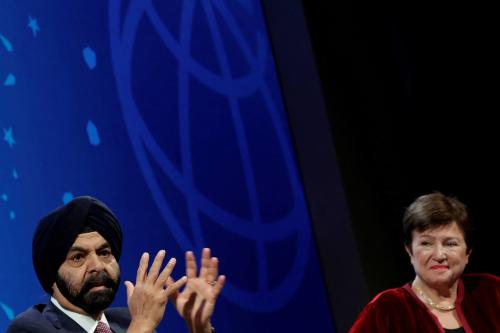In a few days, the governors of the International Monetary Fund will endorse a package to conclude the second and final (for now) stage of the governance reform initiated in 2006 by Rodrigo de Rato, then managing director. Two years later, all the dogged efforts and the countless meetings to hammer out new and more transparent criteria for allocating voting power within the institution will have produced a minuscule shift of about 2.7 per cent in favour of developing and emerging-market countries. So there will be little to celebrate when finance ministers and central bank governors gather in Washington on Saturday for the IMF’s ministerial meeting.
The recent outcome makes it clear that Europe has little or no strategy where the IMF is concerned. This reflects the growing disconnection between the internal and the external institutional frameworks for eurozone monetary policy. Whereas the European Central Bank has enjoyed an effective delegation to preserve the internal purchasing power of the euro, the same cannot be said about the management of the eurozone’s external monetary policy.
Nowhere is this more evident than on the IMF board, where representation for the (now 15) eurozone member states spills across eight different chairs, which often group countries that have little or no connection to the eurozone. Ireland, for instance, is with the Canadian chair; Spain rotates the chair of the central American constituency with Mexico and Venezuela, which currently heads the group; Finland rotates the chair of the Nordic-Baltic group with Denmark, Iceland and Sweden, which leads the constituency before Iceland takes over. Other eurozone countries have their own chairs (France and Germany) or are represented by Italy, Belgium and the Netherlands. Their constituencies, however, also include non-eurozone (and non-European Union) countries. These arrangements are even more awkward at the biannual meetings of the International Monetary and Finance Committee, the IMF’s ministerial committee, when discussions among governors and ministers include the ECB president – the only central banker to be invited as a guest and not as full-fledged committee member.
But quotas and voting shares are only one aspect of IMF governance. The other is representation on its resident policymaking organ, the executive board – and this crucial element was sorely missed during the recent discussions on IMF reform. One potentially important development in this regard is the recent call by the US for a reduction in the 24-chair board, to 22 chairs in 2010 and 20 in 2012, that would, however, preserve the number of developing-country and emerging market-country chairs. The implication is that the reduction will come at the expense of Europe.
The IMF’s charter only allows for a 20-seat board. Keeping the current number of board seats requires a special decision by an 85 per cent majority every two years; this essentially gives the US, with 17 per cent of the voting power, default veto rights.
If the eurozone were instead to consolidate its representation, it would lay the groundwork for more effective representation within the policymaking organ of the IMF. The US, with its single chair and 17 per cent voting power, is much more effective in shaping the institution’s policies than the eurozone members in their combined eight chairs, even though they hold collectively 23 per cent of the voting power. Second, it would remove the biggest obstacle to the strengthening on the IMF’s board of the voice of developing countries, which might then feel more engaged with the institution. Third and most important, it would reverse the current perception of Europe as being a hindrance to the workings of the IMF by sticking to the status quo.
Since the establishment of the single European currency 10 years ago, the euro has demonstrated a lot of strength. Indeed, at its current exchange rate of about 1.56 to the dollar, the euro’s value translates the gross domestic product of the eurozone as being bigger than that of the US. The single currency has, of course, also soared in value against the pound, the yen and even remains stronger than the renminbi, despite the appreciation of the latter in recent years.
In addition, the euro-denominated bond market has grown phenomenally, outstripping the US market in size. Both the bond and currency markets have demonstrated that a eurozone can work. The time has come for this zone to adopt a more responsible global leadership position. Of course, if Europe were to lead itself down this path, much-needed reform of the membership of the Group of Seven leading industrial nations, the Group of Eight and other such key global forums would be much easier to arrange.
The current IMF arrangements are not an insurmountable challenge for countries that have already had the courage to surrender their domestic monetary sovereignty. The six-month French presidency of the EU, to begin in July, will be the perfect opportunity to lay this card on the table – and to see just how “European” a hand President Nicolas Sarkozy is willing to play. With the euro still rising on the dollar, he certainly could not ask for better odds.


Commentary
Op-edHow Europe Can Shape the International Monetary Fund
April 8, 2008